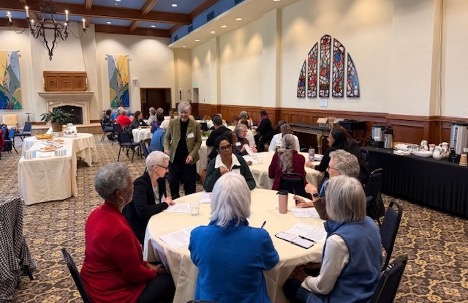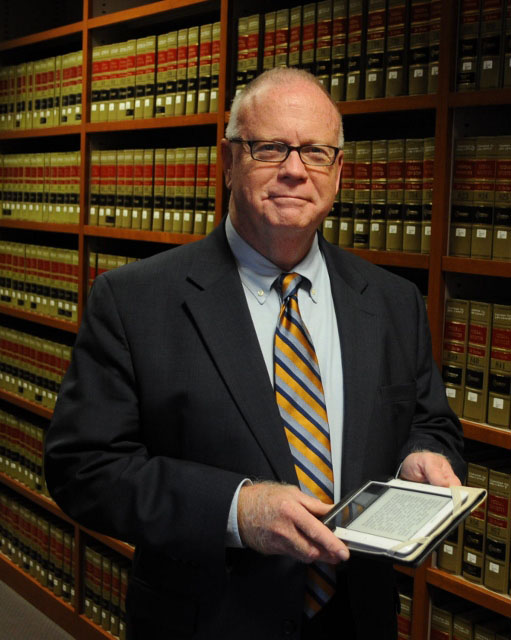 More than 60 women gathered Nov. 16, 2024, at Saint Luke’s Episcopal Church in Atlanta to study women of the Bible.
More than 60 women gathered Nov. 16, 2024, at Saint Luke’s Episcopal Church in Atlanta to study women of the Bible.
The Third Annual Womanist Midrash began when St. Luke’s invited The Rev. Dr. Wil Gafney, to discuss her work at the suggestion of St. Luke’s members Rev. Glennis Shepherd and Rev. Marie Fortune, said The Rev. P. Kimberleigh Jordan, PhD of St. Luke’s.
Gafney, who is an Episcopal priest and biblical scholar at Brite Divinity School, specializes in womanist biblical interpretation and gender and race topics. She uses the Jewish method of expanding on sacred texts called Midrash.
Jordan said the expansive study method has become an opportunity for women from St. Luke’s and neighboring Ebenezer Baptist Church to engage with Dr. Gaffney’s Biblical translations and works.
“When we use exclusively male language in worship, we have limited our understanding and access to the wholeness of the divine Holy One,” Jordan said.
After prayer and singing, Rev. Shepherd and other leaders answer questions including, “Who is The Rev. Dr. Wil Gafney?” “What is Midrash?” “What is Womanist… and Womanist Midrash?” and “How do we name God and Why does it Matter?”
Rev. Shepherd defined Midrash as a process of searching and expanding on biblical texts to reveal deeper meanings. It has multiple meanings: a process, a body of literature, and individual stories. Midrash contains ancient sermons, anecdotes, and cultural explanations of scripture. Starting from a single verse or word, Midrash offers imaginative interpretations of the text.
“Some describe it as ‘sacred imagination’ or ‘narrative expansion,’ allowing us to explore and connect with biblical stories on a deeper level…
“Dr. Gaffney has taken off and done this wonderfully imaginative thing. Midrash written by and about women come out of our own experience of sacred literature, of feminine images of God, asking questions from women’s points of view,” Shepard said.
This year’s midrash studies were of the stories of Rahab and Jael recounted in Joshua 2 and Judges 4 and 5.
After reading each scripture selection and hearing about Dr. Gafney’s Midrash the women gathered around tables for “Woman Talk” for time to reflect, share their insights, questions, and personal experiences.
The discussion about the Joshua passage about Rahab focused on her using her position as a dealer in fine clothes and women to gain wealth and information.
One table discussion focused on the limited options for women in biblical times, including being labeled as prostitutes, which were connected to attaining knowledge, influence, and survival.
Another table related her situation to challenges faced by modern women leaders, such as being unfairly characterized when seeking positions of power. Comparisons were drawn between Rahab’s story and the experiences of contemporary women in leadership.
The discussion of the Judges passage of the biblical tale of Jael, who kills the warrior king Sisera by driving a tent spike into his head focused on her empowerment and strategic manipulation of gender dynamics to overthrow an oppressive figure at one table.
Another table reported talking about reconciling the image of women as peacemakers with Jael’s actions as an assassin, comparing her to a “female James Bond.” This spurs another conversation on justifiable homicide and the roles assigned to individuals in times of conflict.
The Womanist Midrash event alternates each year between the two downtown Atlanta churches; a rhythm that reflects the longtime collaboration between Ebenezer and St. Luke’s that also includes shared book studies, hymn singalongs, and potluck meals.
During her sermon on Sunday following the event St. Luke’s Rector The Rev. Winnie Varghese praised the event.
“Midrash is a beautiful thing. We just had a little bit of that study here at this church yesterday. It is the telling of the story between the words in the white space in the unprinted text, like a tall tale told from a rocking chair on a porch. It is the filling out in the illustration,” Varghese said.
Jordan, who is St. Luke’s Minister for Formation, Community Ministries, and Creative Arts, said organizing the event requires extensive work by a team comprised of members from St. Luke’s and Ebenezer Baptist. “And actually, we’ve said today is the beginning of planning for next year,” Jordan said.
Jordan acknowledged the inherent inefficiency of managing a dual leadership team but view it as an opportunity for relationship growth and deeper fellowship.
“It’s less efficient to work with a leadership team from both churches. So that’s one of the reasons it takes longer. But that inefficiency also helps us grow in those relationships,” she said.
Jordan said the partnership is especially beneficial in the current time for promoting dialogue and understanding among women of different racial backgrounds and faith traditions. This event and others hosted by the two churches underline a shared dedication for these communities to connect, share experiences, and support each other, Jordan said.
She said the Womanist Midrash is about more than Bible study.
“Particularly right now, after the election, it’s important that White women and Black women and women of color, who are all women of faith, get in a room and see each other deeply and hear each other and hear each other’s experiences. So that’s as much a part of what we’re doing as studying a particular Bible scholar,” Jordan said.
For more information on Gafney and hosting Midrash studies, contact Jordan at kjordan@stlukesatlanta.org.

